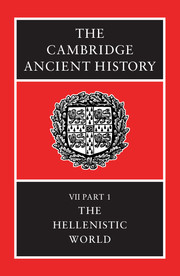Book contents
- Frontmatter
- 1 Sources for the period
- 2 The succession to Alexander
- 3 Monarchies and monarchic Ideas
- 4 The formation of the Hellenistic kingdoms
- 5 Ptolemaic Egypt
- 6 Syria and the East
- 7 Macedonia and Greece
- 8 Cultural, social and economic features of the Hellenistic world
- 9 Hellenistic science: its application in peace and war
- 9a Hellenistic science
- 9b War and siegecraft
- 9c Agriculture
- 9d Building and townplanning
- 10 Agathocles
- 11 The Syrian-Egyptian Wars and the new lingdoms of Asia Minor
- 12 Macedonia and the Greek leagues
- BIBLIOGRAPHY
- Index
- Map 3. Egypt.
- Map 4. Hellenistic Asia.
- Map 5. The Greek mainland and the Aegean.
- References
9c - Agriculture
from 9 - Hellenistic science: its application in peace and war
Published online by Cambridge University Press: 28 March 2008
- Frontmatter
- 1 Sources for the period
- 2 The succession to Alexander
- 3 Monarchies and monarchic Ideas
- 4 The formation of the Hellenistic kingdoms
- 5 Ptolemaic Egypt
- 6 Syria and the East
- 7 Macedonia and Greece
- 8 Cultural, social and economic features of the Hellenistic world
- 9 Hellenistic science: its application in peace and war
- 9a Hellenistic science
- 9b War and siegecraft
- 9c Agriculture
- 9d Building and townplanning
- 10 Agathocles
- 11 The Syrian-Egyptian Wars and the new lingdoms of Asia Minor
- 12 Macedonia and the Greek leagues
- BIBLIOGRAPHY
- Index
- Map 3. Egypt.
- Map 4. Hellenistic Asia.
- Map 5. The Greek mainland and the Aegean.
- References
Summary
Agriculture had always been, and was to remain, the basis of the ancient economy. The aim of this section is to consider the effect on agriculture of the very changed political, social and cultural conditions which followed Alexander's conquest of the East. In the new political world of Hellenistic kings and inter-connected Greek cities, in the context of royal patronage encouraging experimentation and the production of scientific and technical literature, how far were actual agricultural practices either developed or modified? What were the effects on agriculture of the changes in land-tenure brought by the arrival of new settlers? As so often, answers can only be partial, provisional and impressionistic. Egypt is the only country for which the surviving documents allow a more thorough investigation and here the pattern of irrigation-agriculture was always peculiar to the Nile valley, geographically and climatically divorced from the rest of the Mediterranean basin or the Hellenistic kingdoms of the East.
One of the most striking features of this period is the growth of scientific and practical manuals. When in 37 B.C., at the end of a productive literary life, the Roman writer Varro published his de re rustica he introduced his work (1.1.8–10) with a list of his predecessors and sources, more than fifty of them. His Latin predecessors, the two Sasernae and Cato, are mentioned later (1.2.22 and 28) and in an otherwise Greek context pride of place is here ascribed to the Carthaginian Mago, whose Punic handbook in twenty-eight books was translated into Greek and condensed into eight of the twenty books of Cassius Dionysius of Utica.
Keywords
- Type
- Chapter
- Information
- The Cambridge Ancient History , pp. 363 - 370Publisher: Cambridge University PressPrint publication year: 1984
References
- 1
- Cited by



